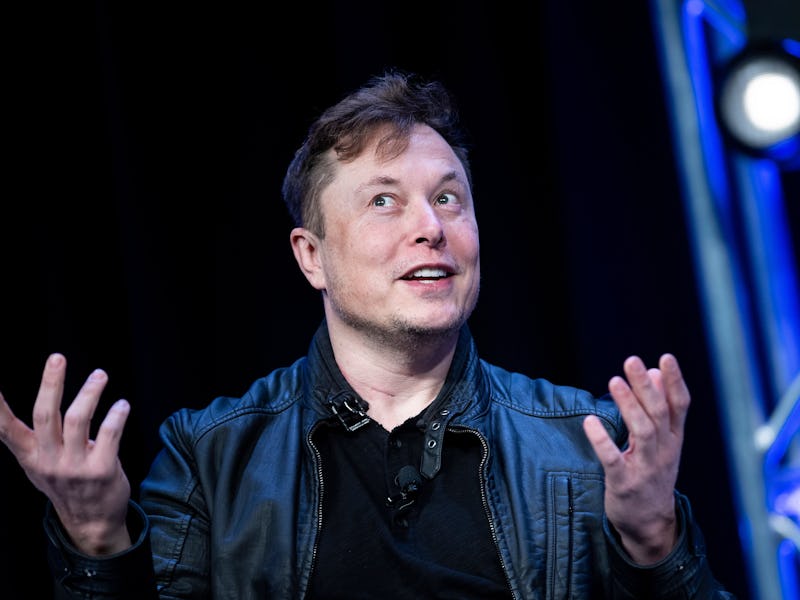Elon Musk's worldview on A.I. explained in 6 minutes
The Tesla and SpaceX CEO described his firm's progress with Autopilot semi-autonomous systems, before describing his views of the universe.

Elon Musk believes the universe is simulatable. It's just a matter of having the right inputs.
The Tesla and SpaceX CEO spoke last week at the Shanghai-based World Artificial Intelligence Conference. While last year's appearance made headlines through Musk's on-stage disagreements with Jack Ma, Musk's pre-recorded video message this year meant it was a more subdued affair. But the CEO's fascinating comments around artificial intelligence reveal how Musk sees the universe as a whole as a computer problem waiting to be solved.
Musk responded to a question about Tesla Autopilot, the semi-autonomous driving mode that Tesla wants to one day develop into a fully-autonomous system. This is expected to use computers and artificial intelligence to make driving decisions based on its understanding of the world. After describing the challenges and successes of the project, Musk segued from discussing how the system is designed to work to compare it to the universe as a whole.
"If you simply ran a true physics simulation of the universe, it will take a long time to compute, but a true physics simulation of the universe, if you give it enough time, eventually you will have sentience. The proof of that is us. And if you believe in physics and the arches of the universe started out as quarks, electrons, and hydrogen for quite a while. And then helium and lithium and supernovas, the heavy elements formed and billions of years later, some of those heavy elements learned to talk. And so we are essentially evolved hydrogen. If you just leave hydrogen out for a while, it turns into us. I think people don't quite appreciate this!"
"At what point from hydrogen to us did it become sentient?" Musk concluded.
Musk's comments are fascinating, in part because it highlights a particular worldview. Rather than scientific equations aiming to describe the world as observed, Musk suggests that there are knowable "true" equations that govern the universe waiting to be discovered. It's just a matter of finding the right ones.
Musk is not exactly alone in this: Robbert Dijkgraaf, director of the Institute for Advanced Study, explained in Quanta Magazine how Albert Einstein believed that there was a single, unique way to construct a functional universe. But Dijkgraaf also explained that the Standard Model of particle physics would suggest that the universe has a series of free parameters, ones that need to be measured in experiments, which "can be seen as the polar opposite of Einstein’s dream of a unique cosmos."
This isn't to say that Musk is right or wrong, but that he steps from ongoing scientific research ahead to a hypothetical end result. This gives a clear vision of what the goal looks like but doesn't reveal too much about the path ahead.
The implications of this become clear during the same video. Musk claimed the company is nearing fully-autonomous driving, with the "basic functionality" complete as early as "this year." He described full autonomy as something akin to a "march of nines," where teams will develop the system further to reach a solution that is safe in 99.999 percent of cases. This figure will have an increasingly larger trail of nines as time goes on.
Will Tesla need a driver soon?
Musk also explained how the Shanghai factory will over time use more artificial intelligence in its daily operations. A factory, he explained, is a "cybernetic collective involving humans and machines." He did state, however, that it will probably "take a while" to get an A.I. solution up and running in the factory.
In both these examples, Musk appears to see a problem waiting to be solved by the right computer-powered system. Like with the overarching view of the universe, driving and building a car are both tasks with a hidden set of equations, waiting to be fleshed out by the right team.
While it's a useful way of understanding the ultimate end goal, it obscures the path ahead. Musk outlined the autonomous driving project in October 2016, promising a cross-country road trip by the end of 2017. In October 2018, having seemingly underestimated the task ahead, Musk wrote on Twitter that it's “extremely difficult to achieve a general solution for self-driving that works well everywhere.”
Musk was notably more reserved about the potential for the Shanghai factory, perhaps because of his experiences at the Nevada factory. Ahead of the July 2017 manufacturing of the Model 3, Musk outlined an idea for an "unstoppable alien dreadnought" with high levels of automation, building cars at speed. The company failed to meet its production targets, and Musk said in April 2018 that "humans are underrated" and “excessive automation…was a mistake.”
While Musk was claiming that the universe could be simulated, he's claimed before that this reality is the simulation itself. At a 2016 event, Musk declared that society is "clearly on a trajectory to have [video] games that are [visually] indistinguishable from reality," which in turn "would seem to follow that the odds that we’re in base reality is one in billions." In April 2019, he said that he would ask a human-level A.I. to tell him what's outside the simulation.
Musk may well be correct in his assertions about the universe's physics. But much like autonomous driving and factory automation, having the vision for the end result is different from knowing the path ahead.
This article was originally published on